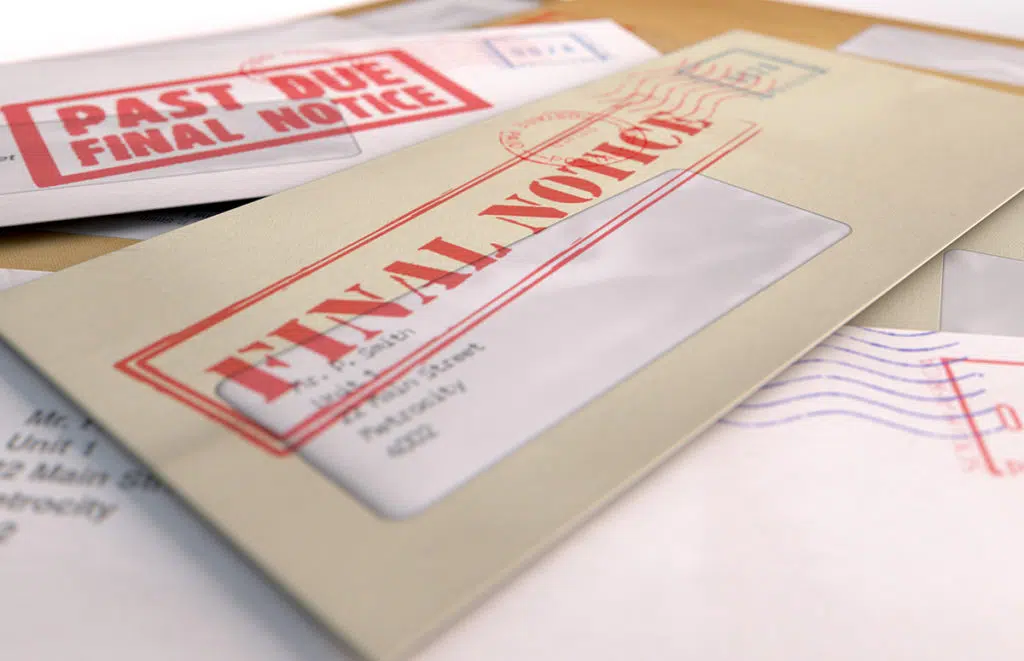
It’s never good news to receive a letter of demand also known as a section 129 notice from your creditors. But don’t let it leave you feeling like there’s no way out. This article will discuss the process of dealing with a letter of demand (section 129 notice) from your creditors and advise on what steps you should take in response.
A letter of demand or section 129 notice is a permanent demand for money owed. Section 129 notices are used by individuals, businesses and agencies when they feel that it is time to take their creditor to court in order to secure payment of an outstanding debt or where they have been unsuccessful in arranging payment by any other means. If you receive a Section 129 notice, then it is important that you seek the advice of a qualified legal professional or debt counsellor as soon as possible.
A section 129 notice is the final stage before the legal procedure begins, and it is one of your last options to prevent legal action from your creditors. The notice is delivered in accordance with Section 129 of the National Credit Act (NCA) and informs the consumer that they are in arrears of a particular amount in unpaid instalment(s) as of a certain date.
After the client has been in arrears for more than 20 working days, the credit provider or their attorney may issue notice in accordance with Section 129 of the NCA at any time. The credit provider may not take any legal action until it has completely satisfied with the NCA requirements outlined in sections 129 and 130.
The section 129 notice is your final chance to act before your credit providers take significant legal action against you. Seeking a debt management plan, such as debt counselling, can help you avoid legal action and keep your assets from being repossessed. You can talk to one of our experienced advisors today about one of our life-changing solutions.
Your creditors may issue you a section notice if they believe you have defaulted on your repayments or if they are unsure whether you will be able to make future repayments. This notice allows them to take legal action against you if you do not make the necessary payments. If you are issued with a section notice, it is important to take action immediately and contact your creditors or us on 0410125036 to discuss your options.
If you receive a section notice, it is important to act quickly and effectively in order to protect your rights.
A section 129 notice must meet the general standards and include several crucial data such as your name, ID, and address. A section 129 notice should be properly dated and identify the agreement on which the client is in default as well as the particular sums owed. It should also explicitly state that the letter serves as a “notice in accordance with Section 129.” The notice should say unequivocally that the consumer is in default. The credit provider’s intentions to enforce his rights under the agreement must be clearly specified, as must alternatively remedies and a timeline to avoid additional legal action.
The NCA specifies precise criteria for determining the validity of a 129 notice.
These are the following:
Section 129(1)(b) adds to the above mentioned criteria by stating that:
The NCA Section 129 notice is the final stage before legal action and should be taken extremely seriously to avoid legal action. You still have options at this time, so do not be afraid to seek the expert assistance of a debt counsellor.
Although a demand letter is not as serious as a lawsuit, the court recognizes it as a good-faith effort to resolve the situation and avoid wasting unneeded court resources.
The principal goal of a demand is to notify the defendant that the plaintiff has a cause of action against him or her and convince him or her to settle the claim or eliminate the cause of complaint within a certain time frame in order to avoid formal proceedings.
If the debtor does not comply with the letter of demand, summons will be issued, and the debtor must defend the summons, or a judgment will be given against them.
Calculate How Much You Can SAVE On Your Monthly Debt Repayments by using this free life changing…
How does your Marital Status affect the eligibility to qualify for Debt Counselling in South…
This article outlines the requirements and criteria individuals must meet to qualify for debt counselling…
This article outlines the Latest Debt Review Process Rules for Credit Providers based on the…
This article outlines the Latest Debt Review Process Rules for Registered Debt Counsellors based on…
Use this Free Debt Calculator if you Need a Free Online Debt Assessment Fast. You…